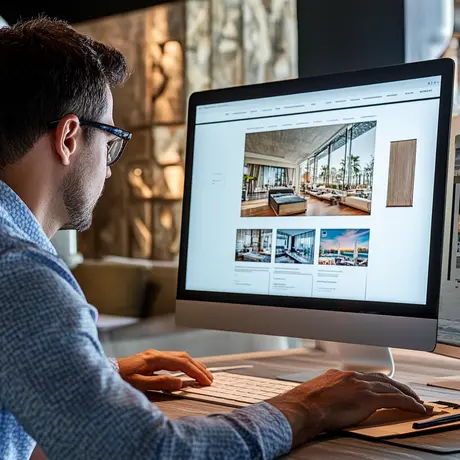When it comes to web design for hotels, first impressions truly matter. Your website is often the first interaction potential guests will have with your property, and it needs to shine. In today’s fast-paced digital world, having a beautiful, user-friendly website isn’t just a bonus—it’s a must. This article will explore how web design for hotels plays a key role in driving bookings, enhancing guest experiences, and setting your business apart from the competition. We’ll also cover essential topics like website design, the benefits of hotel website design services, and how web development impacts functionality.
Creating a standout hotel website involves more than just pretty pictures. From boosting conversions with UX design to crafting an SEO strategy that gets you noticed, there’s a lot to consider. In this article, we’ll walk you through the key features every hotel website needs, how to create one from scratch, and how to choose the right design agency. Whether you’re starting fresh or upgrading an existing site, these tips will help ensure your online presence works as hard as you do.

Why Web Design Matters for Hotels
Having a well-designed website is crucial for hotels aiming to attract guests in today’s digital world. A hotel’s website serves multiple purposes: it acts as a booking platform, a source of information, and a branding tool. Professional web design for hotels not only provides functionality but also plays a vital role in increasing engagement and driving bookings. From seamless navigation to high-quality images, an effective hotel website design ensures potential guests can easily find the information they need and complete their bookings.
Here are key reasons why web design is essential for hotels:
1. First Impressions Count
A hotel’s website is often the first interaction potential guests have with the brand. A clean, visually pleasing layout creates a positive first impression and encourages visitors to stay longer and explore.
2. Mobile Responsiveness
With over 50% of web traffic coming from mobile devices, a responsive web design ensures guests have a great experience, whether they visit the site on their smartphone or desktop. This enhances their journey from browsing to booking.
3. Improved User Experience (UX)
Prioritizing user experience design through easy-to-use features like fast load times and clear call-to-action buttons helps convert visitors into paying guests.
4. SEO and Visibility
Incorporating SEO strategies in web design and development boosts the website’s search engine ranking, driving more traffic to your hotel website and improving direct bookings
A Website is Your Hotel’s First Impression
Your hotel’s website is often the first point of contact potential guests have with your brand, and first impressions are made in seconds. When a website looks outdated or is difficult to navigate, visitors might leave and not return, damaging your reputation. A thoughtfully designed website speaks volumes about the quality of your hotel. It reassures potential guests that your property is professional and trustworthy. This is where working with a UX research agency or conducting UX audits can make a difference. Ensuring your website loads quickly, looks modern and works seamlessly across devices, enhances guest trust and increases the chances of securing bookings.

Key Features of a Hotel Website
Creating an effective web design for hotels requires incorporating essential features that enhance the user experience and drive direct bookings. A well-structured website not only showcases the hotel’s offerings but also ensures smooth functionality and ease of use. Below are ten key features that every hotel website should include.
1. User-Friendly Navigation
Easy-to-use navigation is critical to guiding users through your site. Visitors should be able to find key information, like room details or contact options, quickly. Clear menus and links reduce frustration and encourage longer visits.
2. Booking System Integration
A seamless booking system is a must-have for any hotel website. This feature allows guests to check availability, choose their stay dates, and make reservations easily, contributing to higher conversion rates.
3. High-Quality Visuals
Professional images and videos play a huge role in enticing potential guests. High-resolution visuals of rooms, amenities, and surroundings allow visitors to imagine their stay, making them more likely to book.
4. Responsive Web Design
A responsive design ensures your website works flawlessly across devices, from desktops to smartphones. With more travelers using mobile devices to browse and book, this feature is vital for maintaining engagement and accessibility.
5. Compelling Content
Rich content highlighting your hotel’s unique selling points, services, and local attractions can help build trust and engagement. Detailed descriptions paired with testimonials or reviews also aid in credibility.
6. Call-to-Action (CTA) Buttons
Clear and compelling CTAs, like “Book Now” or “Check Availability,” guide users to the next step in the booking process. These should be prominently placed and visually stand out on the page.
7. SEO Optimization
Implementing SEO practices helps improve your hotel’s visibility on search engines, bringing more organic traffic to your site. Optimizing content, images, and meta tags can improve search rankings.
8. Social Media Integration
Linking your hotel’s social media accounts to the website lets visitors stay connected and updated. It also offers a platform to share promotions, guest experiences, and real-time updates.
9. Secure and Fast Loading
Website security, ensured by HTTPS, and fast loading times are crucial for retaining visitors. A secure website builds trust with guests, while fast load speeds improve the overall user experience.
10. Contact Information and Maps
Prominently display your hotel’s contact details, including phone numbers and email addresses. An interactive map showing your location helps guests find you easily.
Responsive Design and Mobile Users
In today’s digital age, responsive web design is essential for any hotel website. More than half of online users browse and book using mobile devices, so your website must be optimized for all screen sizes. Visitors should experience a seamless interface whether on a smartphone, tablet, or desktop.
A responsive web design adjusts content automatically based on the device, ensuring text, images, and navigation elements remain user-friendly. Without a responsive design, users may struggle to navigate your site on smaller screens, leading to frustration and potential lost bookings.
Additionally, mobile-friendly websites support faster load times, which is critical for user retention. A slow site can result in users leaving before they complete their booking, negatively impacting conversions. Prioritizing user-centered design in your mobile experience ensures better engagement and boosts the likelihood of securing direct bookings.

Boosting Conversions with UX Design
Good UX (User Experience) design is vital for web design for hotels because it affects how users act and helps increase bookings. A well-designed website makes booking straightforward, giving visitors a pleasant experience. This helps reduce any issues, keeps users interested, and makes it more likely they’ll book a stay.
A key part of UX design is user-centered design, which focuses on what the user needs and wants. Simple navigation, clear labels, and easy-to-find information like room availability, prices, and amenities are essential. Hotel websites that make booking quick and easy see more bookings. For instance, clear call-to-action buttons like “Book Now” or “Check Availability” help guide users to make a reservation smoothly.
Small design elements, called micro-interactions, like button animations or smooth page transitions, also improve the user experience. These elements create a positive feeling, which keeps users engaged and reduces the chance they’ll leave before booking. Hotel owners must pay attention to the look and feel of their website to make sure it matches their brand and looks attractive.
Good UX design also helps the website perform better. Fast-loading, mobile-friendly sites get more bookings, especially since many users visit hotel websites on their phones. A responsive design that works well on all devices ensures a smooth booking experience for everyone.

SEO and Content Strategy for Hotel Websites
SEO (Search Engine Optimization) is essential for hotel websites. It helps attract more visitors and makes the site easier to find on search engines like Google. When done well, SEO boosts hotel websites in search results, bringing in more potential guests and increasing bookings. For web design for hotels, SEO improves both visibility and user experience by making key information easy to access.
Using location-based keywords like “hotels near Central Park” or “luxury beachfront hotel in Miami” targets specific searches. These keywords help hotels appear in local search results. This is important because guests often include locations when searching. Optimizing title tags, meta descriptions, and headers with these keywords helps search engines rank your site higher.
Creating content like detailed room descriptions, blog posts, or travel tips improves your site’s visibility. This type of content helps your hotel rank for various search queries and attracts guests who are still in the research phase.
A well-structured, stunning hotel website also helps search engines index your pages better. Working with a user experience company or hiring a UI UX design agency ensures the site is both SEO- and user-friendly. Fast-loading, mobile-friendly sites improve website performance, reduce bounce rates, and increase bookings. By collaborating with UX designers and product designers, hotel owners can create a smooth, seamless booking experience.

How to Create a Website for a Hotel
Creating a website for a hotel can seem overwhelming, especially if it involves complex features like online booking systems and detailed visual content. To ensure a successful website launch, many hotel owners find it helpful to work with professionals. Hiring a UI UX design agency ensures your website not only looks great but also provides a seamless user experience. Below are key steps for creating a hotel website, along with suggestions on why hiring experts is more beneficial.
1. Define the Purpose and Features
Before starting, outline the purpose of your website. Will it be a simple site showcasing rooms, or will it include booking integrations, reviews, and special offers? Clear goals help you and the web designer understand what’s needed. For a new website with advanced features, a professional web designer for hotels can build a site tailored to your needs.
2. Choose a Simple Design
A clean, simple design enhances usability. Avoid cluttered layouts and focus on easy navigation. Guests should be able to find information quickly. Design elements like room descriptions and amenities should be placed strategically. A UI UX design agency can ensure your design is user-friendly while reflecting your hotel’s brand.
3. Optimize for Mobile
In today’s mobile-first world, a responsive site is essential. Website design allows your site to adjust to different screen sizes, ensuring a smooth experience on mobile devices. Mobile users are often on the go, so your site needs to load quickly and function well.
4. Create a Compelling Landing Page
Your homepage is your first impression. A strong landing page should feature stunning images, a clear call to action, and easy access to booking options. This is where you show off your hotel’s personality and brand. A leading hotel website should invite users to explore more and convert visitors into guests.
5. Work with Professionals
Building a hotel website involves various technical elements. Instead of trying to do it all yourself, consider hiring a UI UX design agency. They can handle everything from layout to functionality, ensuring a professional result. With experts, you’ll get a site that not only looks great but performs well across all platforms.

Choosing the Right Hotel Website Design Agency
Selecting the right web design for hotels is crucial to creating an effective and engaging online presence. A professional hotel website design agency ensures your website reflects your hotel’s brand and meets guest expectations. Here are some key points to consider when choosing a web design agency:
1. Review Their Portfolio
Look for agencies with experience in hotel website design. Check their previous work for both creativity and functionality. Ensure they have handled projects that align with your goals and offer flexible website design and development solutions for hotels.
2. Read Client Reviews and Testimonials
Reading reviews from previous clients helps gauge the agency’s reliability and professionalism. Look for patterns in feedback regarding the agency’s communication, turnaround times, and the quality of the web designer’s work.
3. Assess Their Expertise
A good agency should offer a full range of services, including UX, SEO, and mobile optimization. Ensure they have a team that understands the specific needs of the hotel industry, such as booking systems and guest engagement strategies.
4. Communication and Collaboration
Clear communication is vital. When selecting an agency, make sure they are responsive and open to feedback. Ask about their process for managing projects and how they handle revisions throughout your hotel website development.
Benefits of Outsourcing to Experts
Outsourcing your hotel website design to professionals comes with several advantages:
1. Access to Expertise
Agencies often have experienced designers who specialize in hotel websites. This ensures your site includes industry-specific features like booking engines and room galleries, leading to a polished and professional result.
2. Cost Efficiency
Outsourcing can be more affordable than building an in-house team. It allows you to save on recruitment and training while still accessing top design talent at competitive rates.
3. Faster Turnaround
Agencies are equipped to handle tight deadlines. They have dedicated teams that can work on different aspects of the project simultaneously, ensuring a faster launch for your new website.
4. Scalability
Outsourcing allows for easy scaling of your website as your hotel grows. You can add more features or update designs without the burden of managing the process internally.
By choosing the right web design agency, hotel owners can enjoy a flexible design that enhances the user experience and attracts more bookings.

ScreenRoot: Leading Hotel Website Design Agency
A clean, well-structured web design for hotels is crucial for making a strong first impression. It drives guest engagement by offering easy navigation, high-quality visuals, and a smooth booking experience. Implementing SEO also boosts visibility, making it easier for potential guests to find your site. User-friendly features and responsive design improve guest satisfaction and increase bookings.
For hotel owners, investing in professional web design services ensures better outcomes. A polished website built by experts guarantees functionality and brand consistency across all devices. This leads to an enhanced user experience and higher booking rates. Outsourcing web design also provides access to specialized skills, faster delivery, and scalability as your business grows.
Ready to enhance your hotel’s online presence? ScreenRoot, the UI UX Digital Agency of the Year 2024 at the Great Indian BFSI Awards, is here to help. We specialize in UI UX design, enterprise application design, product innovation, design for next-gen devices, and more. Explore our work and if you still have questions, reach out via WhatsApp or call us at 1800 121 5955 (India). You can also email us at [email protected] or fill out our Contact Form for a prompt response.







